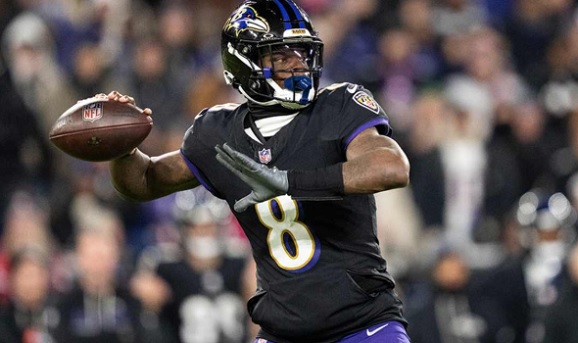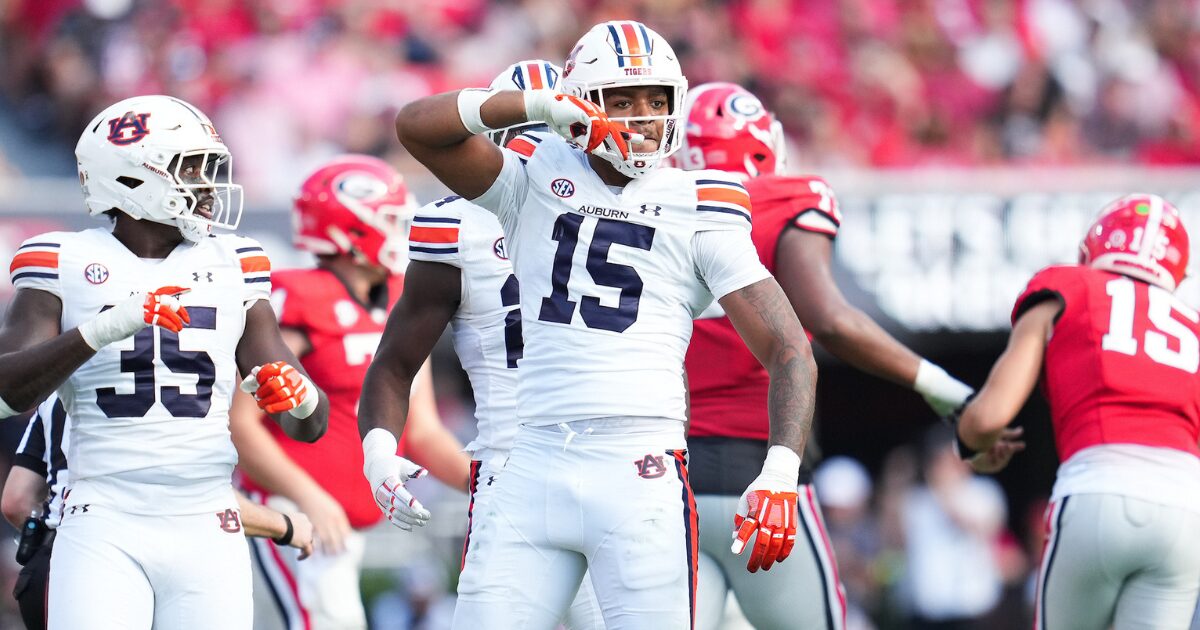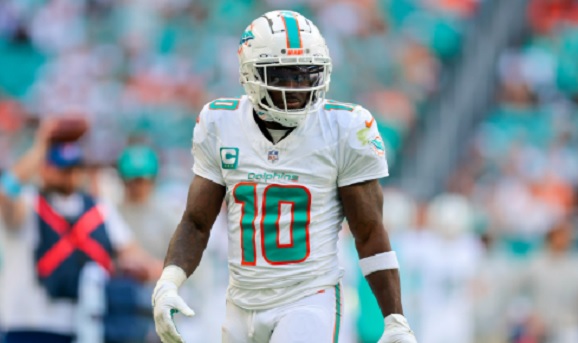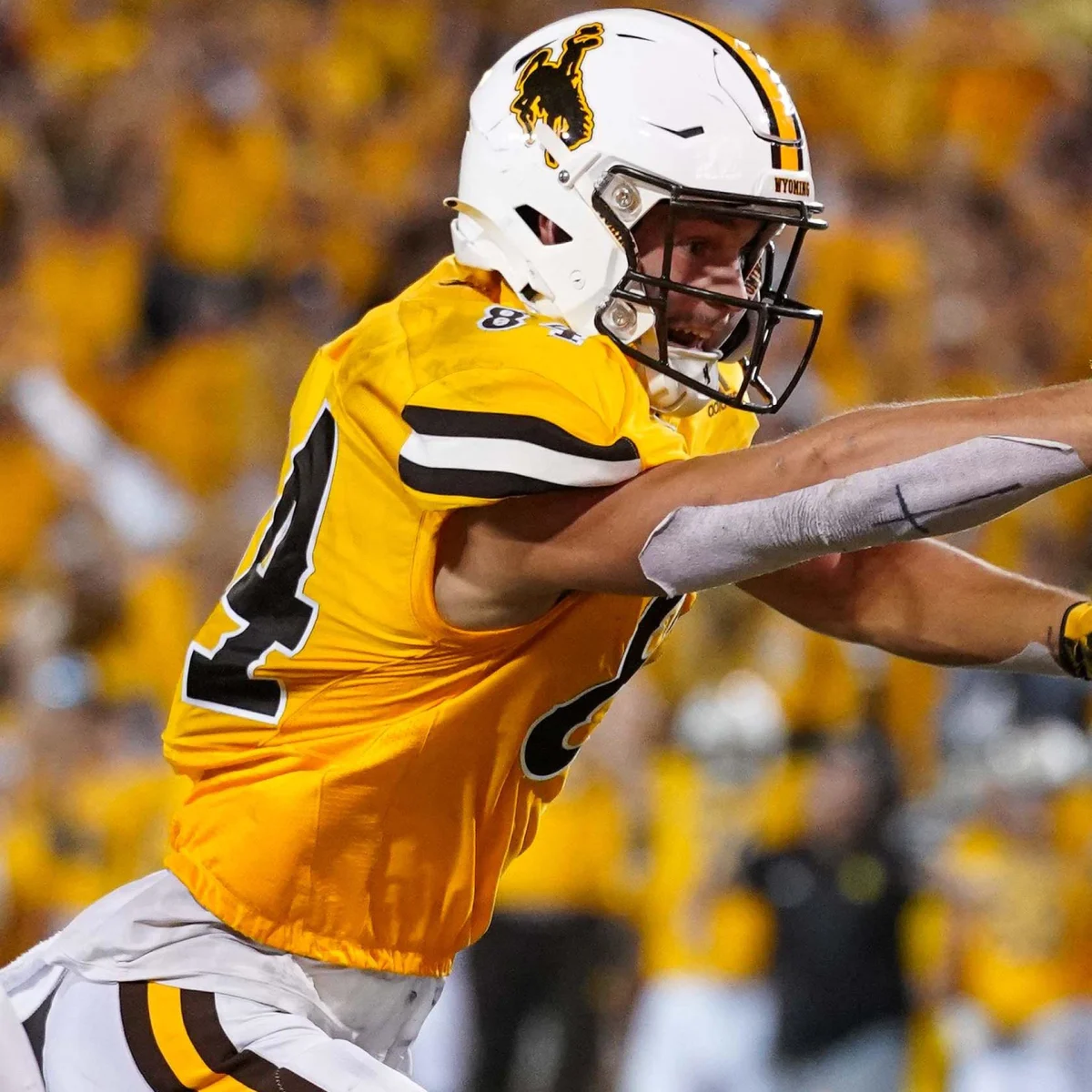Solid Starter
 Miles Boykin, WR, Notre Dame – Round 3
Miles Boykin, WR, Notre Dame – Round 3 
This offseason, the Ravens did a nice job of adding weapons to their offense to help Lamar Jackson improve in the second year of his NFL career. One player who has the potential to be a solid contributor is Myles Boykin. The big wideout brings a size mismatch to Baltimore’s offense and looks like a natural replacement for Michael Crabtree. Paired with first-round pick Marquise Brown, Baltimore added a big wideout and a fast one for Jackson to grow with in his NFL career.
The 6-foot-3, 220-pound Boykin is a physical specimen who presents a size mismatch against NFL defensive backs. Boykin has some straight-line speed and showed it at the combine with a 4.42-second 40 time, but agility and twitch are not his strengths to generate separation as a route-runner. In 2018, Boykin caught 59 passes for 872 yards with eight touchdowns. Prior to that, the Fighting Irish offense really struggled to pass the ball because of limitations at quarterback.
Helping Boykin’s path to be a solid starter is a wide-open depth chart. Veterans like Crabtree and John Brown departed this offseason. Aside from Willie Snead, Baltimore does not really have an established veteran receiver. Boykin’s mismatch size and large catch radius could help him to break onto the field quickly for the receiver-needy Ravens, and before long, he could be a solid starter for them.
2018: Hayden Hurst, TE
2017: Chris Wormley, DE
2016: Ronnie Stanley, OT
2015: Maxx Williams, TE
2014: C.J. Mosley, LB
2013: Arthur Brown, LB
Most Likely To Bust
 Jaylon Ferguson, DE, Louisiana Tech – Round 3
Jaylon Ferguson, DE, Louisiana Tech – Round 3 
This is a surprising choice for me considering the production that Ferguson put together in college, but I see some issues for him translating to the NFL. Of all the all-time great pass-rushers to play in college football, none of them collected as many sacks as Ferguson, who amassed a record 45 career sacks. Still, the Ravens run a 3-4 defense and I think the 6-foot-4, 256-pounder could have issues converting to that kind of system.
While Ferguson had great college production and has good size, he is a very stiff defender who lacks athleticism. He is extremely stiff and struggles to bend around the edge. He can’t sink his hips and inside shoulder. That leads to his struggles to redirect. Some good NFL pass-rushers are stiff players, so that does not mean that he can’t be a good pro. But given his stiffness and athleticism, nobody should be expecting Ferguson to put up the same sack totals he did in college. Ferguson had a misdemeanor simple battery from fight during his freshman season. He was only fined $189 for the incident, but that was enough to get him disinvited from the NFL Scouting Combine by the league.
On top of the skill-set issue, Ferguson is going to enter a tough competition for playing time across from Matt Judon as the Ravens have draft picks invested in other young edge rushers like 2017 third-rounder Tim Williams and 2017 second-rounder Tyus Bowser. Ferguson could beat them out, but those two were buried on the depth chart by Terrell Suggs and Za’Darius Smith.
2018: Anthony Averett, CB
2017: Tyus Bowser, LB
2016: Bronson Kaufusi, DE
2015: Carl Davis, DT
2014: Timmy Jernigan, DT
2013: Brandon Williams, NT
Potential Boom Pick
 Marquise Brown, WR, Oklahoma – Round 1
Marquise Brown, WR, Oklahoma – Round 1 
The Ravens needed to add play-makers and explosive elements to their offense, so Brown was a natural fit for them in the first round of the 2019 NFL Draft. Team sources tipped me off that the Ravens loved Brown, so I had him going to them in my final 2019 NFL Mock Draft. Immediately, Brown will help stretch the field and give Lamar Jackson a threat to score on any reception.
What sets Brown apart is game-breaking speed. He is extremely fast and can score from anywhere on the field. Brown is a true flier who can take the top off a defense with his ability to burn coverage over the top. When Brown gets free, he is nearly impossible to track down, because his dynamic speed can take away angles. Brown is the kind of a receiver who can take a short slant the distance. He also has run-after-the-catch skills with some moves in the secondary, but mostly is a straight-line runner, using his speed to run away from tacklers. Brown has quality hands and route-running. He will need to learn more routes for the NFL, but as a speed receiver, he is adept at running his routes well.
For the Ravens, Brown projects to be a DeSean Jackson-type weapon, and if Lamar Jackson improves his accuracy, the duo could produce a lot of highlight-reel plays during their careers together.
2018: Lamar Jackson, QB
2017: Marlon Humphrey, CB
2016: Kamalei Correa, LB
2015: Breshad Perriman, WR
2014: Terrence Brooks, S
2013: Matt Elam, S
Future Depth Player
 Justice Hill, RB, Oklahoma State – Round 4
Justice Hill, RB, Oklahoma State – Round 4 
After taking Marquise Brown in the first round, Baltimore added to the speed and explosive ability to the offense by taking Justice Hill in the fourth round. There is no doubt that Hill is a natural runner and is very talented. Perhaps the best traits that set Hill apart are his first-step quickness and his burst to get to the second level of the defense. On top of his speed, Hill has good feet with cutting ability to zig zag through the defense. He plays with good knee bend and runs behind his pads, which helps him finish runs well by falling forward. Via patience and vision, Hill lets holes develop before darting downfield. On top of his running ability, Hill is a nice outlet receiver who runs quality routes and makes catches with his hands. The Ravens have their starting running back in Mark Ingram, but Hill should give them some really good depth as a change-of-pace back who offers speed and receiving ability.
2018: Deshon Elliott, S
2017: Jermaine Eluemanor, G
2016: Tavon Young, CB
2015: Buck Allen, RB
2014: Brent Urban, DE
2013: John Simon, LB
Walt’s 2019 NFL Draft Grades:
25. Marquise Brown, WR, Oklahoma A Grade
The Ravens had a huge hole at receiver, so they had to find an explosive play-maker at the position. That’s exactly what they did, and yet they also traded down in the process. While some teams made major reaches in this draft – and some even moved up for those reaches! – the Ravens were patient, moving down in the process to select the player they wanted to help their offense be more explosive. Well done, Baltimore.
85. Jaylon Ferguson, DE, Louisiana Tech A Grade
Jaylon Ferguson, based on his tape alone, would’ve been a first-round pick. We had him in the opening frame for a bit, but Ferguson dropped for two reasons: First, he has some minor character concerns; he had a misdemeanor battery charge. Second, Ferguson tested extremely poorly at the combine. Still, Ferguson is a good player and is worth the risk here, as the Ravens needed to find an edge rusher to replace Terrell Suggs and Za’Darius Smith.
93. Miles Boykin, WR, Georgia A Grade
Miles Boykin is very big (6-4, 220) and extremely athletic. He was one of the top testers at the combine at his position. Boykin would’ve gone much higher than this had he been more productive at Notre Dame. He was just a 1-year starter, but he did very well in that one season. This is the time to take a player with immense upside like this, especially at a position of need. I like this pick a good deal.
113. Justice Hill, RB, Oklahoma State A+ Grade
We’re back to more great picks! Justice Hill is someone I had pegged at the end of the second round or beginning of the third frame. He’s an explosive running back who can go the distance whenever he touches the ball. I don’t think he can handle a full workload, but that’s not required of running backs nowadays. He’ll likely emerge as an excellent play-maker in Baltimore’s new offense.
123. Ben Powers, G, Oklahoma C Grade
Ben Powers is a late-round prospect, who is a bit of a reach here. Powers offers no athleticism or upside at all, but he’s strong and could eventually develop into a starter. He’ll likely be a backup, however.
127. Iman Marshall, CB/S, USC C- Grade
This is a bit of a reach, as I considered Iman Marshall to be a late-round prospect. He played cornerback at USC, but may have to move to safety in the NFL. He just doesn’t have the speed to stay at cornerback. Baltimore could’ve waited on Marshall.
160. Daylon Mack, DT, Texas A&M B- Grade
Daylon Mack was highly recruited out of high school, but barely did anything at Texas A&M prior to 2018. Mack admitted that he struggled with depression, but turned his life around this past season. He clogged running lanes very well, and that should continue in the NFL if Mack remains mentally upbeat. There’s concern with Mack’s lack of positive experience, but the upside is there.
197. Trace McSorley, QB, Penn State C Grade
I’m a Penn State alumnus, and I’m happy to see Trace McSorley get drafted, but I don’t see him sticking in the pros. He’s just way too limited as a passer. I like the point that one analyst made about being able to use McSorley in the same offense as Lamar Jackson, but I don’t think he’ll make the 53-man roster unless Robert Griffin gets hurt.
2019 NFL Draft Team Grade: A . Follow Walter @walterfootball for updates.
Baltimore Ravens Season Preview
2026 NFL Mock Draft - Feb. 17
NFL Picks - Feb. 9
Fantasy Football Rankings - Jan. 29
NFL Power Rankings - Jan. 26




